Collaboratory update January 2023 | Ethiopia
All the latest from our Ethiopian team
31 January 2023
It was wonderful to finally be able to come together as a whole Hub team at our Assembly in Colombia. As the Hub is reaching its final year of the project, it is important that we exchange knowledge and experience, sharing research and learning from each other. Each of our Collaboratory teams had the opportunity to lead sessions and our Ethiopian colleagues led discussions and workshops on climate change, critical water governance, costings, and water values frameworks.
The Assembly offered an important opportunity to take stock of ongoing collaborative projects and plan future cross-collaboratory research. To maximise time spent travelling, Hub researchers from Ethiopia spent time in Popayán in the weeks leading up to the Assembly, developing the collaborative research with Colombian colleagues on social-ecological justice methodologies and social cartography research methods. (Read more here). Endaweke Assegide, WLRC, said: “This is a great contribution to our work with communities in Ethiopia, and the experience will assist my own research in combining and integrating social cartography methods with GIS and remote sensing methods.” Since returning to Ethiopia, the team have held further social cartography participatory sessions, working together with communities to map out their local areas, to help increase their understanding of the interconnectedness of water security, human wellbeing, and ecosystem health. They have also carried out household surveys, focus group discussions, and interviews with stakeholder and community representatives in the selected research sites along the river bank.
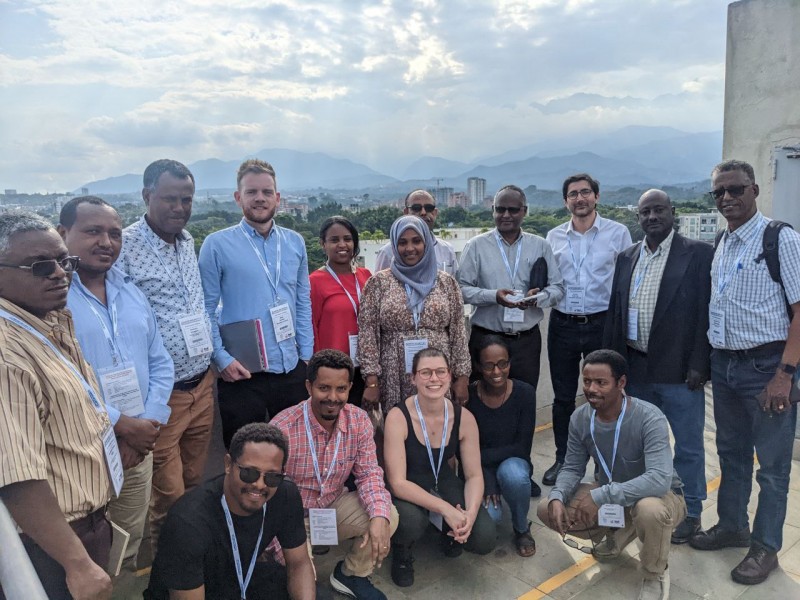
Members of the Ethiopia team at the Hub Assembly in Colombia, November 2022
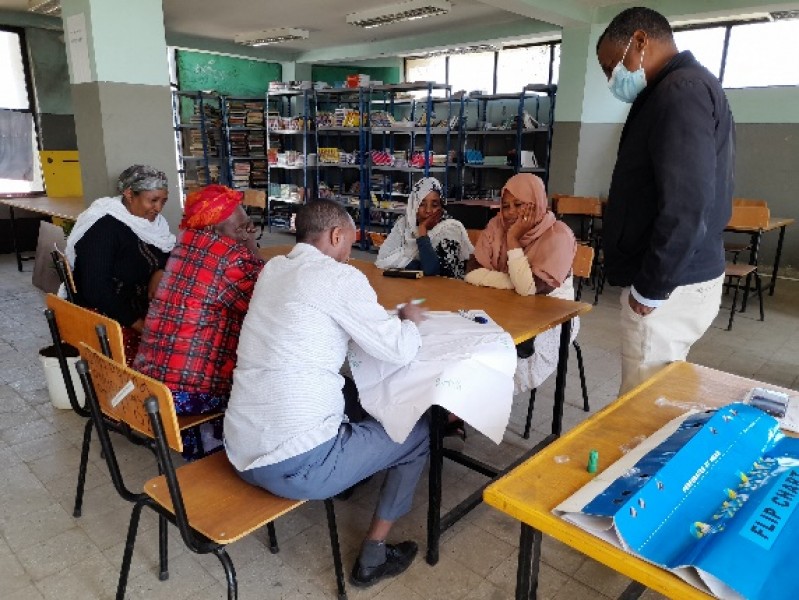
Social mapping with local communities
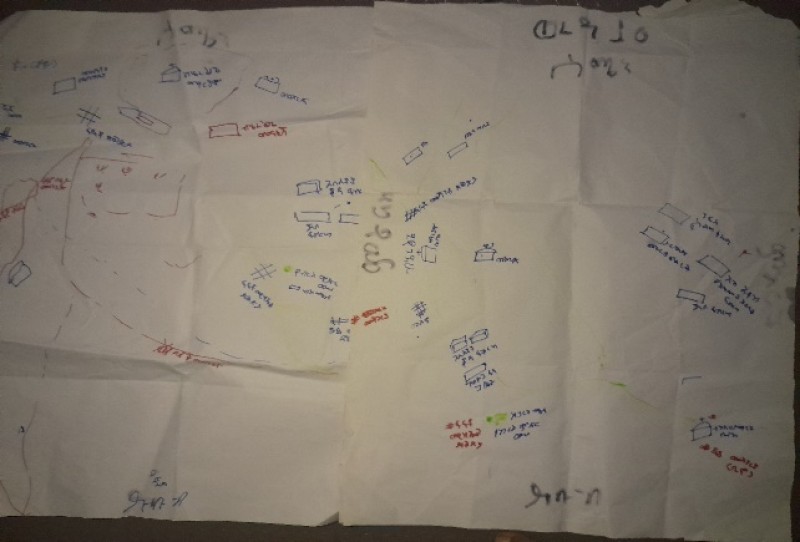
Some of the mapping produced during social cartography workshops with local communities
Our India Collaboratory is leading the Hub’s cross-cutting research on water sensitive planning (WSP). Ethiopian colleagues are adapting the approach for use in Addis Ababa, with plans to conduct stakeholder workshops and discussions, and form an evaluation panel. The team have adopted a framework consisting of seven water sensitive city (WSC) index goals, for example: improve ecological health, achieve equity of essential services, and encourage adaptable infrastructure; and included additional strategic goals that address informality and urban agriculture that is particular to the city context. Once a technical evaluation group is established, the team will liaise with local authorities and experts to hold a collaborative workshop and benchmark Addis Ababa’s water sensitivity. A planned case study will demonstrate how a water sensitive planning approach could be used to inform governance, and establish a sustainable urban future for Addis Ababa and the surrounding region.
Our Ethiopia Collaboratory team is celebrating success. Dr Tibebu Kassawmar and Dr Ermias Teferi have been awarded a Cluster of Cooperation (CLOC) Eastern Africa Seed Money Grant for their research project ‘Unlocking the potential of traditional agricultural water management practises: transformative knowledge co-production to ensure food and nutrition security in the central Rainfed Agricultural Area of Ethiopia’. The agricultural sector is one of the biggest water users in Ethiopia, and this grant will help our team to develop important research into more sustainable water use.
Members of our WLRC team are working on a documentary on water pollution in the Akaki River catchment. Their aim is to portray the severity of the water pollution problem and it's impacts in Addis Ababa, focusing on the Big and Small Akaki Rivers. Production has already begun with filming taking place at some of the team’s miniSASS monitoring sites located around the Akaki River, including the Gefersa Dam, Saris Kokeb flour factory, and tanneries located around Akaki Kaliti. Local residents living in the Akaki catchment area are being interviewed as part of the documentary.
The miniSASS tool has been applied by the team to assess river health across the Upper Awash Basin. Macroinvertebrate samples were collected from multiple sites and identified using the miniSASS dichotomous identification key, and the ecological state of different rivers and types was rated using the miniSASS score. The Akaki rivers are in alarmingly poor ecological state and do not meet the criteria for SDG indicator 6.3.2. Addis Ababa’s industrial and municipal waste is severely polluting the rivers, and the team has recommended that biological monitoring stations be established to tackle and improve the pollution problem. Hub researchers have also collected samples of four fish species (barbs, carp, catfish, and tilapia) from the Koka and Aba Samuel Reservoirs to assess heavy metal contamination, and detailed analysis is now underway.
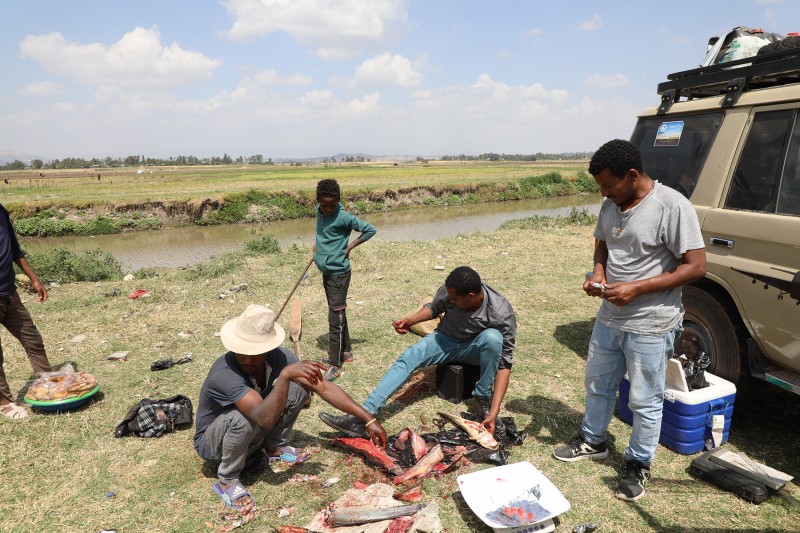
Collecting fish samples for heavy metal contamination assessment
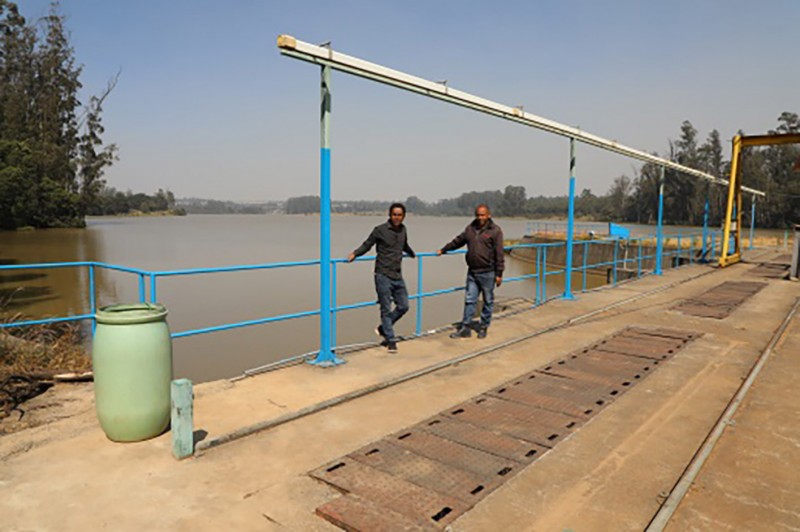
The Gefersa Dam on the Akaki River, one of the miniSASS monitoring sites
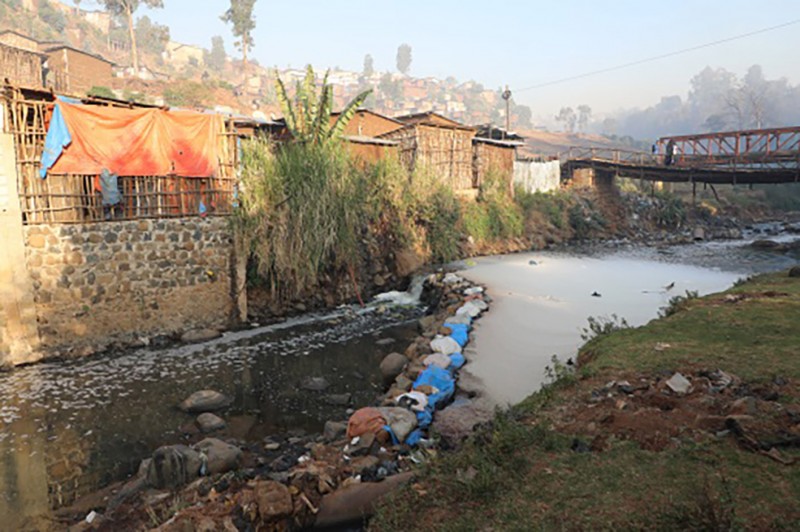
A tannery located in Akaki Kaliti, one of the miniSASS monitoring sites
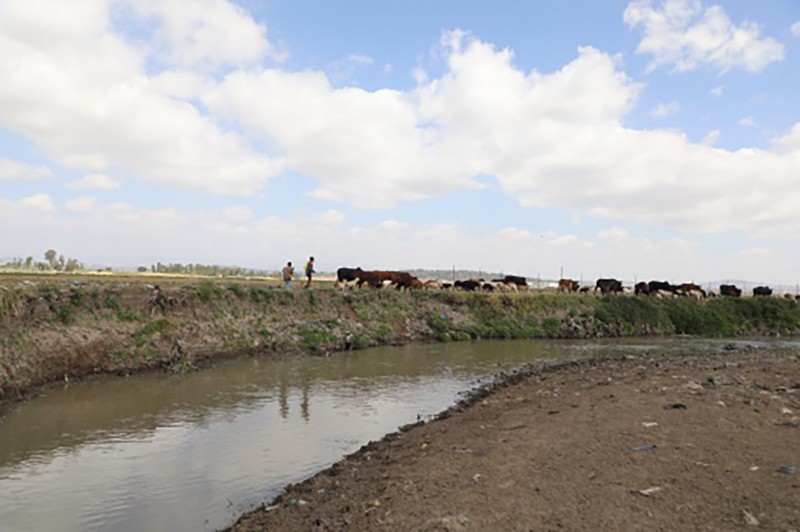
The Aba Samuel inlet on the Akaki River, one of the miniSASS monitoring sites
Ethiopian colleagues have carried out field work on harvesting season flow patterns, collecting and integrating data on land use change and agricultural water use within the Abbay basin. As well as key informant interviews, researchers have held informal conversations with farmers on agricultural water management within the basin. Additional fieldwork on surface and groundwater interaction in the Central Rift Valley (CRV), and characterising wetland and structural controlled water bodies has also taken place. Data collected from 17 stations is enabling researchers to monitor the hydrodynamics of Harabata Lake and adjoining rivers, and measure the velocity of streams, alongside assessments of biophysical change around Harabata Lake, the Meki sub-basin, and Gurage highland. A paper is being drafted following the assessment of groundwater potential in the CRV at the Katar and Meki sub-catchments.
Developing open, trusting relationships with stakeholders for knowledge exchange and co-creation is crucial in ensuring that water security solutions are tailored and fulfil local needs. The Ethiopia team recently held a three day workshop focused on the Akaki catchment of the Upper Awash River Basin. Exploring water pollution management and strategic adaptation, the workshop comprised community and stakeholder consultations and discussions, and a panel session with government organisation representatives. Amongst attendees were decision makers, members of government offices, hospital and school representatives, private sector members, and community representatives from the Woreda 12 Nifas-Silk Lafto Sub-City Administration in Addis Ababa. Stakeholders were able to hear directly from different organisations about their activity, problems identified, solutions tried, challenges faced, and future plans; and contribute feedback, ideas, and suggestions for ongoing and future projects.
The Hub is committed to building capacity across water systems and sectors to realise a more integrated and holistic approach to managing water. Dr Adey Mersha of WLRC delivered a five-day training programme on the WEAP hydrological model for the Rift Valley Lakes Basin Development Office and Regional Water Bureaus. Training activities covered concepts of water allocation and management; applications of the Water Evaluation and Planning (WEAP) tool; practical sessions and simulations of water resources modelling using WEAP; and discussion on results and their practical implications. By actively involving experts that have a good knowledge of local contexts, the training will help build technical capacity, enable more informed water management, and support future basin development plans in the CRV.
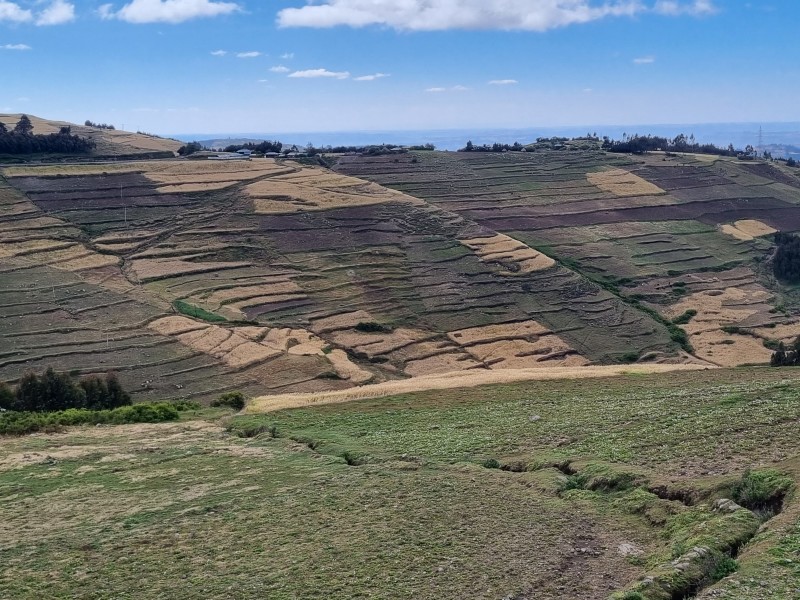
Rainfed agricultural land on a steep slope located within the Jemma sub-basin
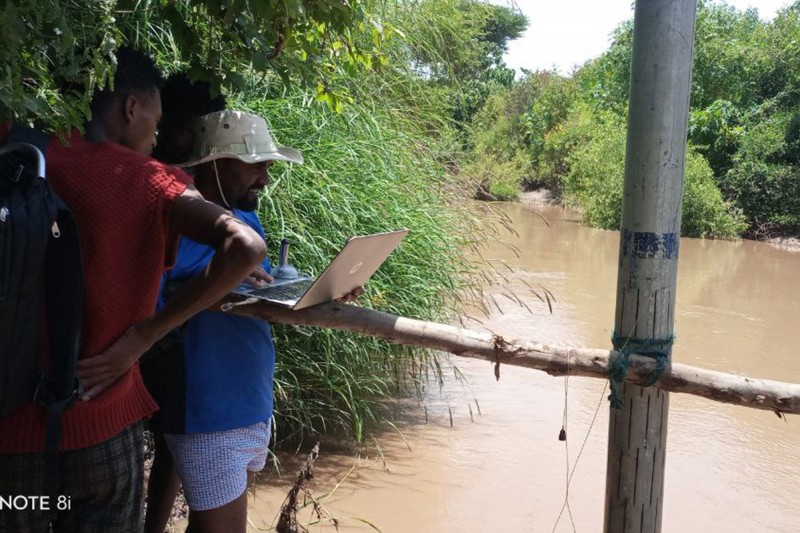
Monitoring hydrodynamics in the CRV
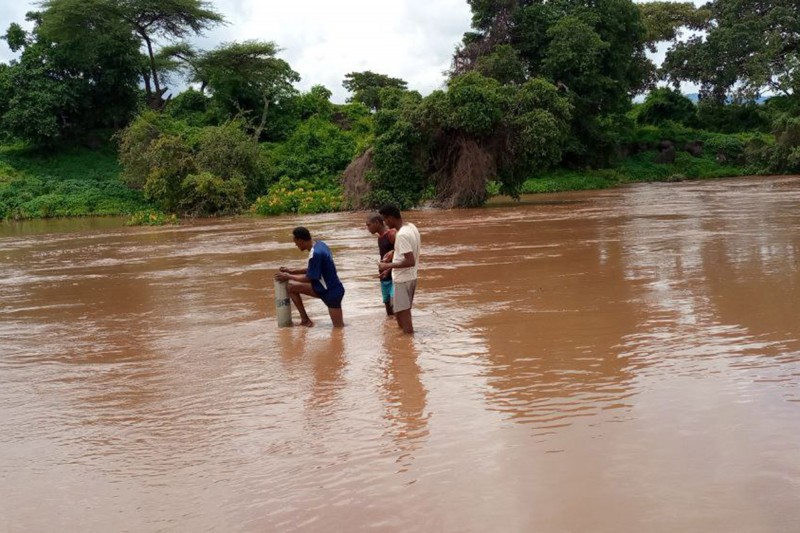
Monitoring hydrodynamics in the CRV

Participants of the Akaki water pollution workshop presented their shared visions on the issue

Colleagues working on costing in water distribution from IWMI, Newcastle, and AAWSA
Our IWMI team is also working closely with stakeholders to build capacity. Working collaboratively with the Addis Ababa Water and Sewage Authority (AAWSA) and Newcastle University, Hub colleagues held the workshop ‘Geomatics Application in Costing: The Case of Addis Ababa’s Water Distribution Network’, with water supply engineers. The co-planned workshop covered fundamentals of utility financing, financial aspects of water utilities, and applied financial concepts. The team is planning to conduct field work to validate water distribution network maps to build on this.
Researchers in our IWMI team have kicked off their project working within the One Health Initiative. At the project’s launch workshop Javier Mateo-Sagasta introduced the CGIAR One Health Initiative: Water Work Package, and emphasised how the Hub’s research in the Akaki catchment will contribute to increasing understanding of the role of water in pathogen transmission and antimicrobial resistance (AMR). Hub researchers have already conducted extensive water quality sampling and tests, working in collaboration with four local laboratories, Newcastle University, and the Chinese Academy of Sciences. This important research will contribute to improving understanding of public health and water linkages, and extend the Hub’s legacy in water quality research beyond our project end date.
Finally, Dr Ermias Teferi and Dr Tibebu Kassawmar are serving as guest editors for a special issue of Frontiers in Sustainable Food Systems, titled ‘Land Management and Food/Nutrition (In)Security in Mixed Farming Systems’.


Take a look at this infographic that captures some of the Ethiopia team's achievements to date, including key research findings and exciting next steps.



